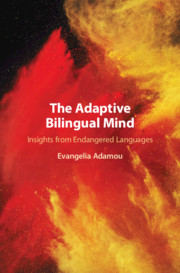Book contents
- The Adaptive Bilingual Mind
- The Adaptive Bilingual Mind
- Copyright page
- Contents
- Figures
- Tables
- Preface
- Acknowledgements
- Abbreviations
- Introduction and Methods
- Part I Do Bilinguals Maintain Language-Specific Conceptualizations?
- Part II Are Bilinguals Confronted with High Cognitive Costs?
- Part III Conclusions
- Glossary
- Appendix Research Participant Consent Form
- References
- Index
Part I - Do Bilinguals Maintain Language-Specific Conceptualizations?
Published online by Cambridge University Press: 23 April 2021
- The Adaptive Bilingual Mind
- The Adaptive Bilingual Mind
- Copyright page
- Contents
- Figures
- Tables
- Preface
- Acknowledgements
- Abbreviations
- Introduction and Methods
- Part I Do Bilinguals Maintain Language-Specific Conceptualizations?
- Part II Are Bilinguals Confronted with High Cognitive Costs?
- Part III Conclusions
- Glossary
- Appendix Research Participant Consent Form
- References
- Index
Summary
Is human language necessary for the formation of concepts? Evidence from other species establishes that even the very small1 brains of bees are capable of forming some ‘concepts’, understood not only as perceptual classifications of real world stimuli (referred to as ‘categorizations’), but also as relational classifications that are formed while abstracting away from specific stimuli (Avarguès-Weber et al., 2012). For instance, Avarguès-Weber and colleagues found that bees are able to learn spatial relationships such as ‘above/below’ and ‘right/left’ in combination with ‘difference’. Such findings address a fundamental question that has been tackled by philosophers since ancient times by suggesting that human language is not necessary to form concepts.
- Type
- Chapter
- Information
- The Adaptive Bilingual MindInsights from Endangered Languages, pp. 47 - 98Publisher: Cambridge University PressPrint publication year: 2021



